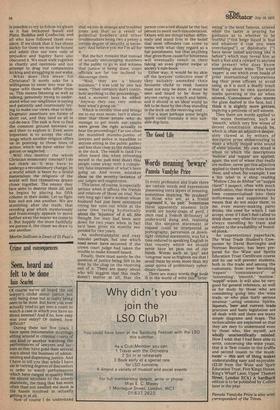Crime and consequences
Seen, heard and felt to be done
lain Scarlet
Of course we've all heard the old lawyer's cliche about justice not only being done but actually being seen to be done. But have you ever actually tried to get into a court to watch a case in which you have no direct interest? And if so, how easy was your entry? Or indeed, how difficult?
During these last five years I have spent innumerable mornings sitting around in criminal courts of one kind or another watching the performances of lawyers and laymen as they have gone their several ways about the business of administering and dispensing justice. And I have to tell you that while I have sat in varying degrees of discomfort in order to watch performances which have ranged in quality from the almost excellent to the utterly shambolic, the thing that has more often than not needled me most is the hassle involved in actually getting in at all. Now of course I do understand
that we live in strange and troubled times and that as a result of potential bombers and other .troublemakers being two a penny a certain degree of security is necessary. And believe you me I'm all for it.
But the fact remains that instead of actually encouraging members of the public to go in and witness that justice is being done, court officials are far too inclined to discourage them.
"Well, they are a bloody nuisance," I was told by one last week. "They certainly don't contribute anything to the proceedings." And a moment later he added: -Anyway they can very seldom hear what's going on."
Which is terribly true and brings me to my next moan. Isn't it about time that those people who do manage to get inside our courts were given the right actually to hear the proceedings? Far too often the mumbled mumbo-jumbo of lawyers and police is inaudible to anyone sitting in the public gallery and less than clear to the defendant in the dock. The result is (and I've often heard this when refreshing myself in the pub next door) that people come away with a completely false impression of what's been going on. And worse, mistaken ideas on the severity/lenience of our judges and magistrates.
This latter, of course, is especially serious when it affects the friends and relatives of those on trial. Not very long ago I saw a woman whose husband had just been sentenced crying her eyes out while at the same time raving hysterically about the 'injustice' of it all. She thought her man had been sent down for two years when in fact he'd been given six months suspended for two years.
An understandable and easy mistake perhaps, but one which need never have occurred if the crown court judge had taken the trouble to make himself heard.
Finally, there must surely be the question of justice being felt to be done by the chap on the receiving end of it. There are many about who will suggest that this really doesn't matter at all, that the person convicted should be the last person to merit such consideration. Others will see things rather differently and stand firm in the belief that most offenders can come to terms with what they regard as a fair punishment, but that anything that gives them cause for bitterness will eventually result in their taking an even greater swipe at society's rule-book.
Either way, it would be no skin off the lawyers' collective nose if they suitably amended their favourite cliché to read: Justice must not only be done, it must be seen and heard to be done by anyone caring to watch and listen, and it should in an ideal world be felt to be done by the chap standing in the dock on the receiving end ...
For a start perhaps some bright spark could translate it into suitable dog-latin.


































 Previous page
Previous page